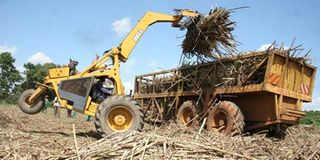Politicking will not solve cane farmers’ problems

Sugarcane is loaded on to a truck at Matulo in Webuye before it is delivered to Nzoia Sugar Company in Bungoma on May 22, 2014. FILE PHOTO | JARED NYATAYA |
What you need to know:
- Importation of sugar, lucrative as it may be, does not benefit the ordinary farmer.
The noisy political commotion over sugar has, in my view, been unnecessary as it has diverted attention from more serious issues such as the poor farmers who depend on sugar cane.
Issues of sugar importation and the future of the industry are so critical that they should not be turned into a political game.
If we have to get to the root of the problems bedevilling farmers, we must cast politics aside and engage in a more informed discourse with a view to finding lasting solutions.
The controversy should offer us, as political leaders both in government and the Opposition, an opportunity to institute a thorough review of the way we have managed the sugar industry.
At the centre of this review should be why Kenya continues to import sugar as the option of meeting consumption shortfall instead of finding ways and means of improving the sector.
The reason why importation has remained in the tight grip of the so-called sugar barons, who are essentially middlemen or fronts for those who manage the process, is because it offers easy opportunity for quick money.
Yet importation of sugar, lucrative as it may be, does not benefit the ordinary farmer.
Apart from enriching a few individuals, it has also opened the doors for tax evasion and corruption in and outside government.
As a former chairman of Nzioa Sugar Company, I can state, without fear of contradiction, that the problems lie with the poor and unprofessional way we manage our sugar industry. Indeed, viewed against other sugar producing countries in the Comesa region and the rest of the world, Kenya has the worst managed sugar production system.
Our sugar production is an expensive, wasteful and painful process. While other countries that produce sugar have achieved improved yields through research, Kenya has neglected this important aspect by failing to invest sufficiently in better-yielding cane varieties. Our factories have been running on archaic and outdated machinery because of failure to embrace new technology.
At Nzioa Sugar, for instance, the processing system is so old that it is prone to frequent breakdowns that force the factory to close for months on end to carry out maintenance and rehabilitation of virtually dead machinery. These closures routinely distort the production timetable and delay the harvesting of cane causing most of the crop to go to waste.
And when production resumes, it is crippled by equally old and slow transport system. This, coupled with spillage of cane on the road, makes the whole business too expensive to both the factory and the farmer.
Then there is the problem of financial mismanagement that remains endemic.
The Mumias Sugar Company debacle that has seen the government inject Sh 1 billion is perhaps the best demonstration of this blatant mismanagement. As a country, we must be honest with ourselves and address this cancer called corruption in management of public institutions.
We cannot turn a deaf ear to the cries of farmers who continue to suffer while we resort to imports and let those who plunder the sugar companies go scot free.
Mr Murunga is MP for Kimilili and former chairman of Nzoia Sugar Company




